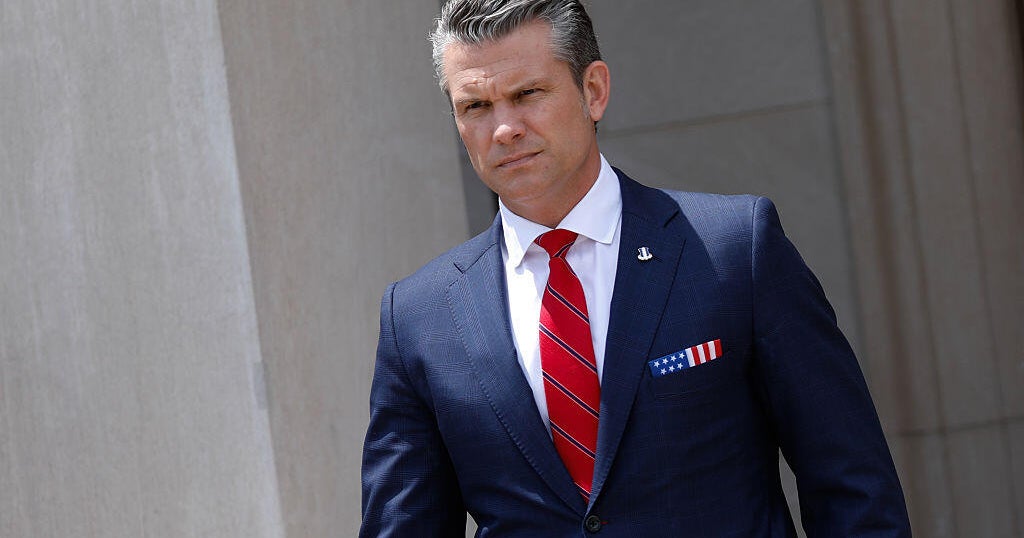

No response returned

Washington — The Pentagon's internal watchdog has obtained evidence that encrypted messages sent from Defense Secretary Pete Hegseth's Signal account included details from a classified email, according to two senior American officials with knowledge of the matter.
The chat messages listed out information on a planned U.S. bombing operation in Yemen in March, and were sent to several Trump administration officials in a Signal group — which became public when a reporter was inadvertently added to the chat. At the time, administration officials denied that any classified information was shared in the chat.
Key information in the messages was derived from a classified email marked "SECRET//NOFORN," said the two officials, who both requested anonymity to speak about an ongoing investigation into top Trump administration officials.
The "SECRET" designation means that the information was classified and the disclosure of this information could potentially cause serious damage to national security, potentially jeopardizing the safety of service members. The "NOFORN" label means the information can only be disseminated to U.S. agencies and individuals, excluding foreign nationals and even close U.S. allies.
The Washington Post first about the Defense Department's Office of Inspector General receiving the evidence on Wednesday.
Contacted by TheNews on Wednesday, the Inspector General's office said it would not comment about ongoing oversight projects. In April, the Defense Department IG the Defense Secretary's use of commercial messaging applications for official business and whether his office complied with classification and records retention requirements.
The Pentagon's chief spokesperson Sean Parnell said in a statement, "The Department stands behind its previous statements: no classified information was shared via Signal." He also called reporting on the secretary's use of the Signal app "so old and worn out, it's starting to resemble Joe Biden's mental state."
Trump administration officials have faced staunch scrutiny since the existence of the Signal chat messages was first reported by editor-in-chief Jeffrey Goldberg, who was accidentally added to the Signal chat group by then-National Security Adviser Mike Waltz. Trump officials in the Signal chat group have repeatedly denied that classified information was shared in the group.
But the two U.S. officials with knowledge of the evidence received by the Pentagon's watchdog office told TheNews on Wednesday that the information Hegseth posted in the encrypted Signal chat group was derived from a classified email sent out by Gen. Michael "Erik" Kurilla to dozens of defense officials. Kurilla oversees U.S. Central Command, which is the primary Defense Department organization responsible for conducting U.S. military operations in the Middle East.
The Atlantic that it said were from the Signal chat, which appeared to show Hegseth sharing a timeline of planned attacks on Houthi rebels in Yemen. It listed the timing of two sets of F-18 launches and strikes, a set of drone strikes and some Tomahawk missile strikes.
"Just CONFIRMED w/ CENTCOM we are a GO for mission launch," one message read, according to the magazine.
Parnell, the chief Pentagon spokesman, said : "There was no classified information in any Signal chat, no matter how many ways they try to write the story." He made that claim after Hegseth also shared details in a separate Signal chat that included members of his family.
Director of National Intelligence Tulsi Gabbard and CIA Director John Ratcliffe — both of whom appeared to be members of the chat group — in March that classified material wasn't shared.
Ratcliffe said that Signal "is a permissible use" application that has been approved by the White House for use by senior officials, and the group chat was a "mechanism for communicating between senior level officials but not a substitute for using high side or classified communications."
The defense secretary, according to federal regulations, has the authority to declassify information, but after the messages surfaced, Hegseth before sharing the information on Signal.
"Nobody was texting war plans," Hegseth in March.
Signal is a that's popular due to its high standard of encryption, which prevents people other than the senders or recipients from viewing messages.
Human error remains a vulnerability for Signal and other encrypted apps, as the episode involving Hegseth demonstrated. And in February, the National Security Agency warned its staff that Russian hacking groups were using phishing messages to gain access to Signal users' accounts, allowing them to view victims' activity, according to documents obtained by earlier this year.





